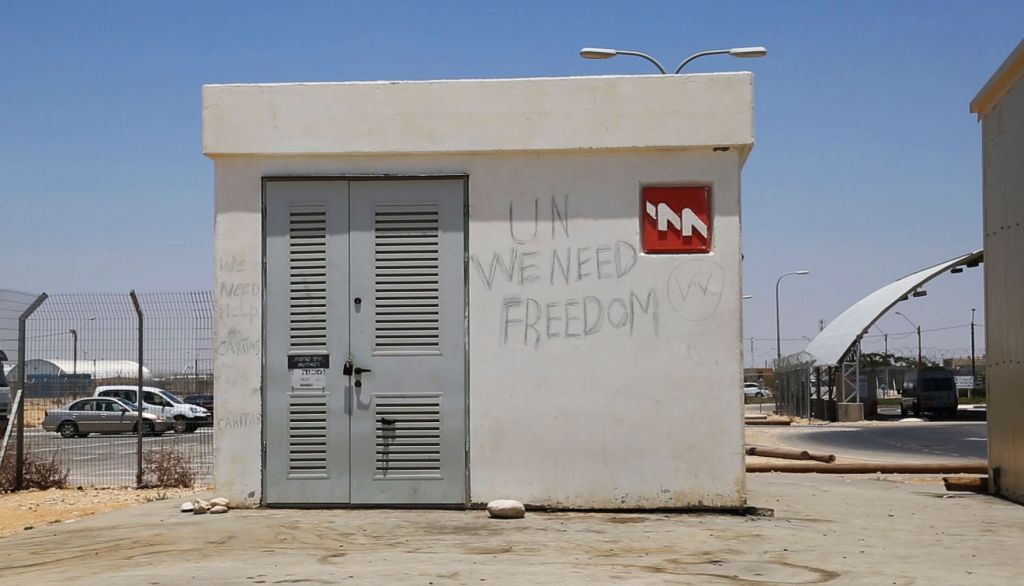HOLOT — A report released Wednesday by a Tel Aviv nonprofit alleges that Israel is forcing dozens of detained African migrants to choose between deportation to Rwanda and indefinite imprisonment.
The Hotline for Refugees and Migrants, in its report, described grim conditions at the Holot detention center in Israel’s southern Negev desert, where nearly 2,000 Sudanese and Eritrean migrants are now held. It describes a new government policy that activists are calling “Rwanda or Saharonim,” the name of the prison down the road from the Holot.
The Israel Prisons Service challenged the report, calling it “one-sided” and saying it failed to accurately portray the realities inside Holot.
A 2014 amendment to the Anti-Infiltration Law allows the government to offer detainees in Holot an ultimatum: They can take $3,500 in cash and voluntarily return to an unnamed African country (according to press reports, Rwanda), or face indefinite incarceration in Saharonim.
According to the Hotline, 43 detainees currently in Holot have been given this choice.
The Israeli government says the voluntary return option has served migrants well.
Public Security Minister Gilad Erdan, a former interior minister charged with handling the policy toward migrants, said in April, “Those Eritrean and Sudanese who previously departed to a third country through the help of the Israeli government are very happy in that country. They have informed us that they are learning English, working and earning good pay. Some have opened a business and are living well.”
But rights groups have questioned the fair and voluntary nature of the policy. Once they leave Israel, the activists argue, the migrants often find themselves denied basic rights and facing difficult humanitarian conditions.
In April, a video released by the Islamic State jihadist group showed the brutal killing of nearly 30 migrants in Libya who were attempting to flee to Europe. One of them had sought refuge in Israel and spent time at Holot before returning to Africa.
Since the only other option to leaving the country is an indefinite prison sentence, activists question the government’s claim that detainees are given a real choice.
They also point to the fact that in recent years, since the spike in the arrivals of African migrants, Israel has granted asylum seeker status to just four Eritreans, and no Sudanese have received such status, out of many tens of thousands who have reached Israel’s border.
Other government methods of coercing migrants to leave the country, the report states, include denying them any legal residency status or work permits. For those detained at Holot, which the government has controversially insisted is not a prison since they are not required to remain on the premises during the day, rough living conditions are also a deterrence to staying in Israel.
Holot is very far from any Israeli population centers, so the mere requirement to check in each night prevents detainees from holding a job or traveling elsewhere in the country.
And though the government insists it is not a jail, Holot is surrounded by barbed wire, and detainees face prison-like conditions inside. According to the report, detainees did not have air conditioners in the sweltering desert heat until an outcry led to their installation. Although they receive a daily NIS 16 stipend, it is often docked if guards accuse the detainees of misbehaving or arriving late to roll call.
Detainees have also protested the facility’s food not meeting basic nutritional standards as well as the occasional confiscation of personal property by guards.
An Israel Prisons Service official refuted those claims, telling the Ynet news site, “Forbidden items are confiscated in accordance with the detention center’s rules and the confiscated items are kept for the detainees. The food at the center is based on dietary plans made by dieticians and professionals, the same as in other Prisons Services facilities… All of their nutritional needs are provided by us.”
The fact that just 2,000 detainees are held in Holot, out of 45,000 spread out throughout the country, including concentrations in Eilat and southern Tel Aviv, demonstrates the state’s difficulty in developing a consistent policy for dealing with the migrants.
The issue has come up repeatedly before the High Court of Justice, which has consistently thrown out previous government policies on the grounds that migrants were not given the right to have their asylum requests examined, and were being imprisoned for years without trial.
But the Israeli government insists the migrants, whom it calls “infiltrators,” are economic migrants looking for work. Thus, they do not meet international standards for receiving protected refugee status.
Critics have responded by noting that the vast majority of the detainees’ appeals for asylum have not even received a response from Israeli authorities, arguing that Israel is trying to avoid seriously examining their situation so as not to become obligated to grant them asylum under international and Israeli law.
Though once a major point of contention in Knesset discussions and the press, the issue has fallen out of the public debate in recent years. This was catalyzed in 2013, when Israel built a five-meter-high fence spanning the Israeli-Egyptian border, in part to prevent more migrants from sneaking into the country.
In the hopes of breaking the standstill, the Hotline’s report implores the government to release Holot’s migrants and grant them work permits. It also calls for the cancellation of the so-called “Rwanda or Saharonim” policy and a meaningful effort on the part of the state to examine detainees’ asylum requests.



